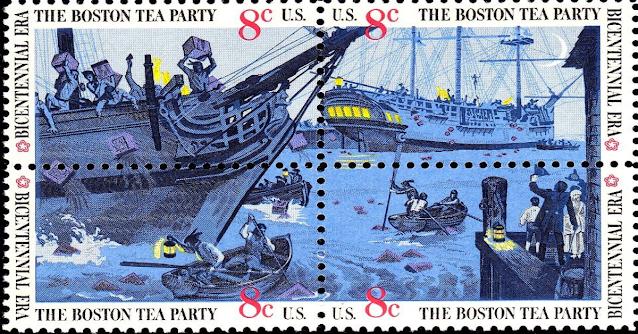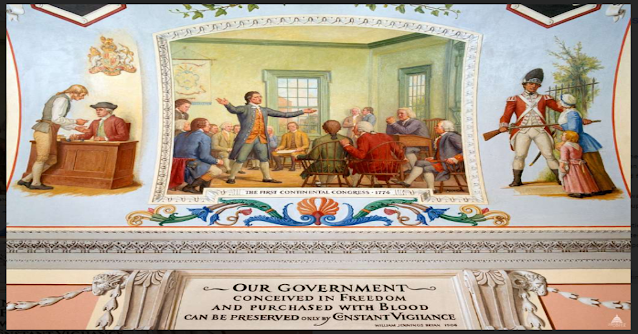Remembering the Sons of Liberty: Boston Tea Party's Architects
Most Americans are aware of the pivotal moment in Boston's history, where a group of people opposed to high taxes and took a bold stand against King George's rule. This act of defiance involved tossing the highly valued tea into the harbor, which became known as the Boston Tea Party. According to Historians credence, the event served as an unofficial Declaration of Independence and played a significant role in uniting the colonies in their fight for revolution.
On the night of December 16, 1773, a pivotal event unfolded in American history. A a grassroots paramilitary cum political organization known as the Sons of Liberty, comprised of people who actively instigated and provoked dissent in colonial America, covered in secrecy took bold and memorable action. They disguised themselves as Mohawk Indians and boarded three British ships anchored in Boston Harbor. In a daring act of protest, they tossed numerous crates of tea into the water. They were active in several colonies, including Massachusetts Bay, Rhode Island, New Hampshire, New Jersey, New York, Maryland, and Virginia. The Sons of Liberty played a crucial role in uniting colonists against British oppression and laying the groundwork for the American Revolution.
 |
Their motivation stemmed from anger towards the Tea Act, a law imposed by the British government that was deemed unjust by American colonists. The Sons of Liberty wanted to express their dissent and push back against British authority. Their actions sparked a rebellion and became a powerful symbol of America's struggle for freedom. This historic event, famously called the Boston Tea Party. In this article, we will explore the causes, events, and enduring significance of the Boston Tea Party, which played a pivotal role in shaping the American Revolution and the quest for independence.
💻 Table of Contents:
- Background: The Tea Act and Colonial Resentment
- The Symbolic Destruction: A Message of Resistance
- The Impact of the Boston Tea Party and the Intolerable Acts
- The Boston Tea Party's Legacy in U.S. History
Background: The Tea Act and Colonial Resentment:
To understand the magnitude of the Boston Tea Party, it is crucial to grasp the circumstances that led to this act of rebellion. The Tea Act of 1773 was a British legislation that granted the East India Company a monopoly on the importation of tea into the American colonies. This move aimed to rescue the struggling company while also asserting British control over the colonial tea trade.
However, this act was met with fierce opposition from the colonists, who viewed it as an infringement on their rights and a continuation of the pattern of unjust taxation imposed by Britain. The Tea Act not only threatened the livelihood of colonial merchants but also served as a symbol of British oppression, fueling the already simmering resentment among the colonists.
 |
The British government didn't like this protest and thought it was like treason. After the Boston Tea Party in 1773, the British Parliament passed strict laws known as the Intolerable Acts in 1774. These laws revoked local self-government in Massachusetts and imposed a trade embargo on Boston. These actions further angered the colonists, leading to protests and the convening of the First Continental Congress in 1774. Tensions continued to escalate, eventually sparking the American Revolutionary War with the Battles of Lexington and Concord in 1775. The Boston Tea Party was an important moment that showed how much the colonists wanted to be free from British rule.
The Symbolic Destruction: A Message of Resistance
On the night of the Boston Tea Party, the Sons of Liberty, a secret organization advocating for colonial rights, executed a meticulously planned operation. Disguised as Mohawk Indians to conceal their identities, they boarded three British ships: the Dartmouth, the Eleanor, and the Beaver, which were docked in Boston Harbor. While the specific individuals who led the protest remain uncertain, influential patriots like Samuel Adams, one of the founding fathers of the United States, played a crucial role in organizing and supporting the event. The group of approximately 50 individuals operated with a resolute determination to make their protest heard.
With swift precision, the disguised patriots unloaded the valuable cargo of tea from the ships. They wrecked 92,000 pounds or 340 chests of tea. The British East India Company, the owner of the tea, estimated its value at £9,659. In today's money, that's around $1,700,000 (equivalent in 2021). Their actions were not motivated by greed or destruction but by a deliberate political statement. They believed that by destroying the tea, they were making a clear and defiant stand against the Tea Act and the unjust authority of the British Parliament.
In March 1774, a Second Boston Tea Party occurred. About 60 Bostonians boarded the ship Fortune and threw around 30 chests of tea into the harbor. While not as well-known as the first Boston Tea Party, this event inspired similar tea-dumping protests in Maryland, New York, and South Carolina.
 |
The destruction of the tea in Boston Harbor was a symbolic act of resistance, showcasing the colonists' resolve to protect their rights and freedoms. By discarding the tea into the water, the patriots were not only rejecting the British taxes but also challenging the very notion of British authority over the colonies.
The Boston Tea Party reverberated throughout the colonies and garnered widespread support. It served as a rallying cry and an inspiration for further acts of resistance against British oppression. In response to this audacious act, the British government enacted the Coercive Acts, also known as the Intolerable Acts, in an attempt to punish the people of Boston and tighten their grip on the colonies. However, instead of quelling the spirit of rebellion, these acts only further united and galvanized the colonists in their fight for independence.
The Impact of the Boston Tea Party and the Intolerable Acts:
After the Boston Tea Party, 92,000 pounds of dumped-tea caused a lingering smell in the harbor. The British responded to the Boston Tea Party by shutting down Boston Harbor until the payment was made for the 340 chests of tea, as stated in the Boston Port Act of 1774. The Intolerable Acts, which included the Boston Port Act, Massachusetts Government Act, Administration of Justice Act, Quartering Act, and Quebec Act, further outraged and united the American colonists against British rule.
You May Also Read:
The Boston Tea Party marked a significant act of resistance by the American colonists. The consequences of the Boston Tea Party and the Intolerable Acts were immense, ultimately igniting the American Revolution, which commenced in Massachusetts on April 19, 1775. The events of the Boston Tea Party also inspired similar acts of resistance in other colonial ports, further fueling the flames of revolution.
Inspired by the original Boston Tea Party, there were at least 10 similar tea parties along the Eastern seaboard, as mentioned in Joseph Cummins' 2012 book. In Philadelphia, just nine days after Boston's event, no tea was destroyed, but the captain of a ship carrying a significant shipment of East India Company tea was threatened with tarring and feathering unless he returned the tea to England, which he ultimately did. Similarly, in Charleston, South Carolina, a ship arrived with tea in November 1774, and although the captain claimed to be unaware of the controversial cargo, angry residents held local merchants responsible and compelled them to dispose of the tea in the harbor themselves.
 |
The Boston Tea Party's Legacy in U.S. History:
After the Boston Tea Party in 1773, many Americans, including John Adams, considered tea drinking unpatriotic. This led to a decline in tea consumption, with coffee becoming the preferred hot drink during and after the Revolution.
In the U.S., activists from different political perspectives have raised the Tea Party as a symbol of protest. In 1973, on its 200th anniversary, protesters at Faneuil Hall called for President Richard Milhous Nixon's impeachment and protested oil companies. In 1998, conservative Congressmen symbolically dumped the federal tax code into the harbor.
The Tea Party legacy continued in modern politics. In 2006, a libertarian political party named the "Boston Tea Party" was founded. In 2007, the Ron Paul "Tea Party" money bomb broke fundraising records, leading to the rise of the Tea Party movement that dominated conservative American politics, culminating in the Republicans' significant victory in the 2010 elections.
Conclusion:
The Boston Tea Party was a protest in 1773 by colonists who objected to British taxation without representation. They demonstrated their discontent by dumping British tea, taken from docked ships, into the harbor. This event was among the initial actions that ultimately led to the United States Declaration of Independence and the American Revolution, which paved the way for American independence. The Boston Tea Party, upon historical analysis, emerges as a political and mercantile protest that set the stage for the unfolding of a decisive destiny.





